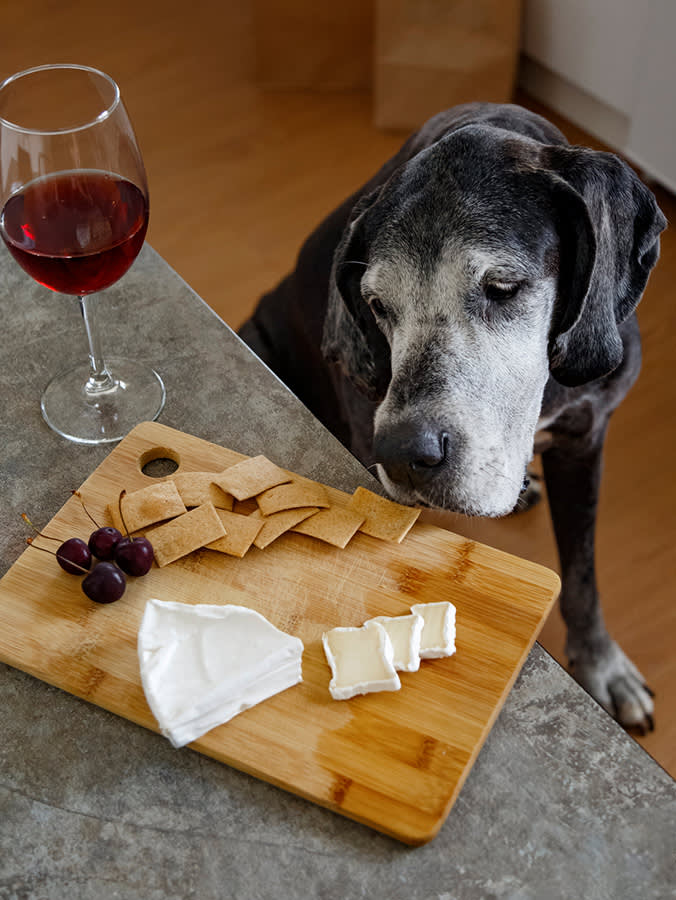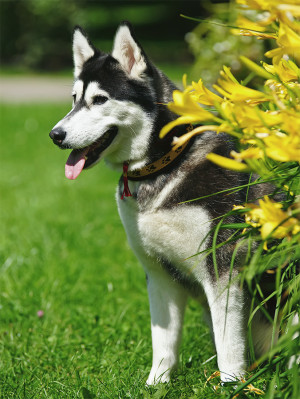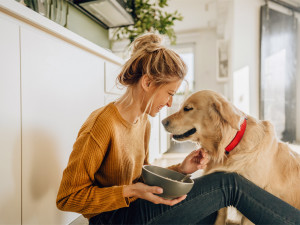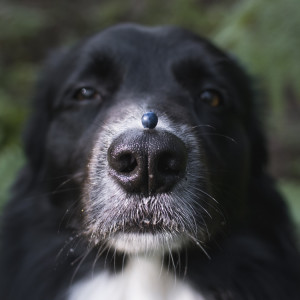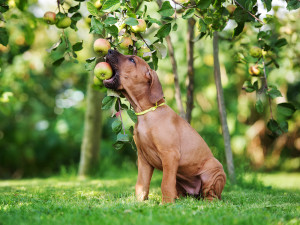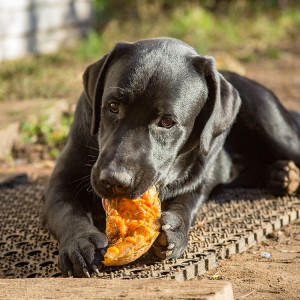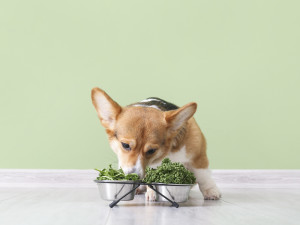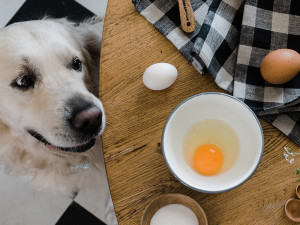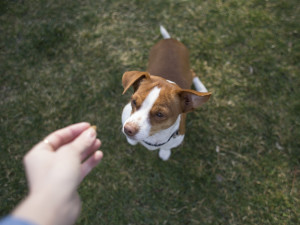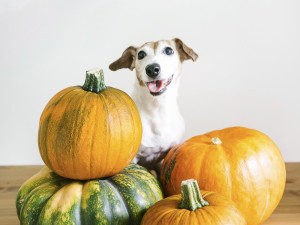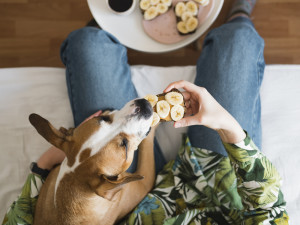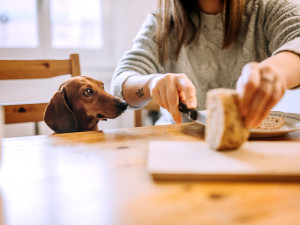Many dogs seem to love cheese, like really, really love it. They develop ultrasonic hearing as soon as you open that wrapper, sending them flying into the kitchen to hoover up any miniscule cheese crumbs they can find. Next, comes the TikTok-famous “cheese tax.” Lots of humans also have a deep love for cheese, and studies have shown that cheese can have an addictive power on our brains much, like a drugopens in new tab.
And yet, many humans also suffer from debilitating digestive problems from eating too much cheese, or other dairy products. So, when it comes to sharing cheese with your dog, what are the rules? Is this a safe choice or a guaranteed middle-of-the-night poop explosion waiting to happen?
The answer is that in small amounts, some cheeses are OK, while others may cause more digestive upset. In all cases, cheese should only be offered as an occasional snack in small amounts to avoid any unwanted side effects.
Nutrition facts about cheese for dogs
Humans have been experimenting with cheese-making since ancient times, and there are thousands of varieties of cheese around the world. Traditionally, cheeses are made from milk, which is then fermented with bacteria and some kind of coagulant until it curdles — yum.
How much do you spend on your pet per year?
Additional ingredients are added to tweak the flavors and different strains of bacteria create different flavors and textures as well. And while none of that sounds especially delicious, the final product is a nutrient dense, high fat, flavorful morsel packed with protein, vitamins and minerals. Here are some of the benefits dogs can obtain from eating cheese:
Protein: Cheese is high in protein, a crucial source of amino acids and energy that dogs need on the daily. All commercial dog foods are required to contain a minimum amount of protein, enough to cover a dog’s daily needs. And most contain way more than the bare minimum. Therefore, any added protein your dog gets from treats and snacks is a bonus.
Fat: The fat content varies among different cheeses but most contain large amounts of saturated fat. Fat is a good source of energy and helps dogs feel full and satisfied with their food. At the same time, too much fat can also lead to unhealthy weight gain which puts dogs at risk for health problems like diabetes and arthritis. Additionally, some dogs do not tolerate high fat foods well and can develop digestive upset or more serious pancreatitis from eating them.
Vitamins and minerals: These vary somewhat among different cheeses, but all cheeses are high in calcium, vitamin A and vitamin B12, all of which are essential nutrients for dogs. These are also provided in all commercial dog foods, so if your dog eats a complete and balanced diet, they are getting adequate amounts of all of their essential nutrients. Anything extra they get from treats and snacks like cheese is an added benefit.
Is cheese good for dogs?
Generally speaking, cheese is not good for dogs, but it usually won’t cause harm in small amounts if you follow some basic guidelines. The main reasons dogs should not eat lots of cheese are that it is a dairy-based food and it is high in fat. Dogs, like all animals, are lactose intolerant once they are weaned as puppies. This means they do not have enough of the enzyme lactase to properly break down foods with lactose during digestion. And just like those of us who are lactose-intolerant, dogs will experience cramps, gas, diarrhea, and/or other digestive upset if they indulge in lots of dairy.
Cheese is a bit more complex than other forms of dairy because in the process of making cheese, a lot of the lactose is actually broken down. Some kinds of cheese may be more benign than others if they contain less lactose. The second concern with cheese is the high fat content. While some fat is great for dogs, too much can put them at risk for digestive upset and pancreatitis, especially when it is in the form of an occasional treat that they are not accustomed to. In the long run, too much fat can also lead to weight gain and additional health problems such as diabetes and arthritis.
While cheese should never be a regular part of your dog’s diet, it does have a few perks worth mentioning too. It can be a perfect vehicle for hiding pills since cheese can be easily molded around a pill to conceal it. It‘s so flavorful and delicious that it easily hides the smell and taste of most medications and will be readily devoured by your pooch.
In keeping with that same theme, for many dogs, it is a high-value treat, meaning it is so delish that they will be very motivated to “earn” a taste. This can make it a very helpful tool when you really need your dog to cooperate such as during vet visits, nail trims, or challenging training sessions. Just remember to save it for those really important moments, and keep the portions small.
Can dogs eat raw milk cheeses?
Dogs should not eat cheeses made from raw, unpasteurized milkopens in new tab. This is because these products are not treated to destroy potentially dangerous pathogens. Eating unpasteurized dairy products like cheese can put dogs at risk for serious illness from bacteria like E. coli, Salmonella, Listeria, Campylobacter, and/or Brucella.
Can dogs eat blue cheese?
Certain cheeses are intentionally inoculated with mold to create unusual flavors and colors, the most common of which is blue cheese. During production of blue cheese, mold from the bacteria penicillium roqueforti is mixed into the cheese. And while these commercially produced cheeses are usually safe in small amounts, it can be dangerous for dogs to ingest any foods that contain mold.
This is because mold spores can contain toxins known as tremorgenic mycotoxins, which can cause serious health problems in dogs including tremors, seizures, and other neurologic signs. The safest option is to avoid sharing any moldy cheese with your dog at all, but to be especially cautious if the cheese is older and has an overgrowth of mold. In that case, it should be discarded and kept far out of reach of your dog.
Is cheese completely safe for dogs?
Cheese is not completely safe for dogs; there are a number of factors to keep in mind before sharing cheese with your dog including:
Lactose content: Fresher, wetter cheeses tend to have more lactose, which can lead to especially unpleasant digestive upset including gas and diarrhea. These cheeses include ricotta cheese and cream cheese. If you do want to share a small bite of cheese with your dog, try to choose a firmer, more mature cheese like parmesan, cheddar, or swiss.
High fat content: Beware of the high fat content in most cheeses. This would not be a good snack choice for a dog who is overweight, has a history of pancreatitis, or tends to get sick from eating other rich, high-fat foods.
Aged cheeses: Cheeses that have been aged for a long time may contain high levels of Tyramine, which can cause high blood pressureopens in new tab, especially for dogs who are taking certain medications like the cough suppressant hydrocodone, or MAO-inhibitors like Selegelline, or SSRIs like Fluoxetine. Check with your vet if you are unsure if your dog’s medication falls into any of these categories, and try to avoid aged cheeses altogether.
Toxins from mold: Moldy foods, including moldy cheeses, can contain tremorgenic mycotoxins, which can cause neurologic signs, such as tremors and seizures. Commercial varieties of moldy cheese like blue cheese are usually less of a concern but if the cheese is old and has a larger quantity of mold, it is more risky.
Raw milk cheeses: Avoid feeding your dog any cheese products made from raw milk that is unpasteurized. These products are more likely to contain dangerous pathogens like E. coli, Salmonella, Listeria, Campylobacter, and/or Brucella that can make your dog sick, as well as being a risk to humans.
Other ingredients: As always, it is important to investigate what other ingredients may be present in the human foods you want to share with your dog. Even if the cheese itself is safe, it could be bad for your dog if there are other ingredients in the dish that are toxic.This includes cheeses that contain raisins, garlic, onions, chives, chocolate, or other unsafe foods.
The bottom line: Can dogs eat human food?
There are many human foods that are safe to share with your dog and can offer added health benefits, in addition to providing variety and enrichment for your pup. In general, it is most important that your dog eat a complete and balanced dog food diet to ensure they are meeting all of their nutritional requirements. If they are filling up on too many treats and table scraps, they may not eat enough of their dog food to get those important nutrients.
Also, snacks should be minimized to prevent weight gain, as obesity can lead to other serious health problems in dogs. A good rule to follow is to limit all snacks and treats to less than 10 percent of your dog’s diet to ensure most of their calories are coming from dog food. Be sure to double-check that any foods you want to share with your dog are safe and nontoxic for them.
Finally, try to use treats and table scraps as incentives for training and good behavior; instead of allowing your dog to beg at the table, ask your dog to sit and wait by their bowl, in their crate, or on their mat, and then reinforce their good behavior with the treat. This can help make training sessions more fun and exciting, while also allowing you to bond with your pup over your favorite snacks.
FAQs (People also ask)
How much cheese can a dog eat?
Dogs should only eat small amounts of cheese and it is important to avoid certain kinds of cheeses that can be more risky for them. In general, table foods should be less than 10 percent of your dog’s total diet.
Is it OK to give dogs cheese?
Some cheeses are okay in small amounts but since cheese is a high fat, dairy-based food, it can cause digestive upset, pancreatitis, and put dogs at risk for obesity, so it is not okay for all dogs.
Why do dogs like cheese?
Cheese is high in fat and protein, which dogs find delicious and satisfying. They are attracted to the smell and chewy texture as well.
Can dogs eat cheese?
Most dogs can eat a small amount of cheese if you select a variety that has less lactose and does not contain other toxic ingredients. It, however, can cause digestive upset for some dogs so it should be shared with caution.
Is cheese good for dogs?
In general, cheese is not good for dogs since it is very high in fat and contains dairy which they cannot digest.
Can dogs eat blue cheese?
Blue cheese and other cheeses that contain mold can be risky for dogs as these molds sometimes contain toxins that can cause neurologic problems in dogs.
Is raw milk cheese safe for dogs?
Cheese made from raw milk is not pasteurized and therefore may contain harmful bacteria that can cause serious illness in dogs. They should not eat raw milk cheese.
Other foods that are safe for dogs
Sweet potatoes are nutritious and delicious for pups
These superfoods are also worth sharing with your dog
Eggs can be used as a high protein snack, too
Other (fruits / veggies / foods) that are dangerous
Grapes are a definite no-go for dogs
Avocado is also not a good choice for your pup
These foods are dangerous for dogs, too
References:
ASPCA Pro: Tremorgenic Mycotoxin Intoxicationopens in new tab
BBC Science Focus: Why is Cheese so Addictive?opens in new tab
Canadian Veterinary Journal: Roquefortine Toxicity in a Dogopens in new tab
Harvard School of Public Health: The Nutrition Source: Cheeseopens in new tab
Indian Journal of Psychiatry: Hypertensive Crisis and Cheeseopens in new tab
Lactose Content of Different Dairy Products opens in new tab
